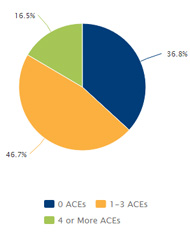|
Today, Kidsdata introduces a brand-new topic to our site, Childhood Adversity and Resilience. The release today coincides with the opening of the Conference on Adverse Childhood Experiences in San Francisco.
The new suite of data complements other Kidsdata topics such as Child Abuse and Neglect, Intimate Partner Violence, and Family Income and Poverty. It includes 56 indicators about the prevalence of adversity and resiliency among California’s children, among mothers of infants reflecting on their childhood, and, exclusive to Kidsdata, among California adults with children living in their homes reflecting on their childhood.
Specific childhood adversity indicators give us a picture of the prevalence of physical, sexual, and verbal abuse inflicted on California children, and exposure to violence, substance abuse, and mental illness. Kidsdata’s release today also includes data on child resiliency, or the ability to mitigate the effects of childhood trauma.
Childhood adversity, sometimes referred to as Adverse Childhood Experiences (ACEs), has come to be seen as an urgent public health crisis. The higher number of traumatic events a child experiences, the more long-lasting impacts those events may have on the child’s physical, mental, and emotional health. These events often lead to serious complications in adulthood, such as chronic diseases, substance abuse, and depression.
California-specific data were compiled from the National Survey of Children’s Health, the Maternal and Infant Health Assessment, and the Behavioral Risk Factor Surveillance System.
This new topic was made possible by a partnership between Kidsdata and the California Essentials for Childhood Initiative and its Shared Data and Outcomes Workgroup, as well as numerous organizations that provided data: Public Health Institute’s Survey Research Group, the California Department of Public Health’s Maternal, Child and Adolescent Health Program, the University of California, San Francisco’s Center on Social Disparities in Health, and the Child and Adolescent Health Measurement Initiative.
Today’s data release helps policymakers, researchers, social workers, and practitioners identify opportunities to prevent childhood trauma, allay its effects, and develop better community support systems that promote resiliency. While California has made strides in these areas, continued efforts are needed to ensure that all children thrive and reach their full potential.
|




